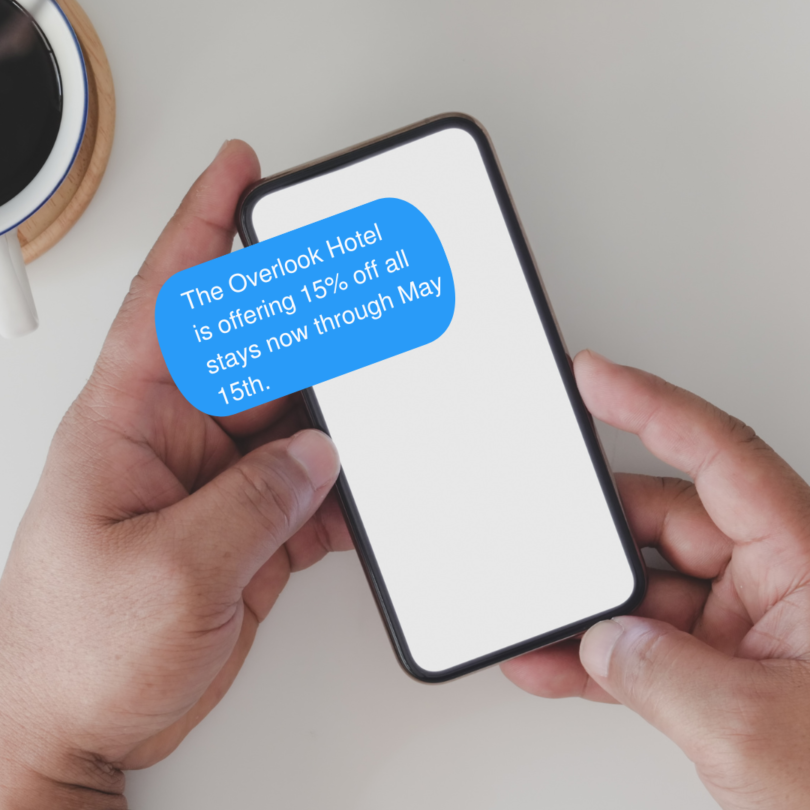Higher Open Rates
One of the primary advantages of using SMS over email is the higher open rates of SMS. According to one report, the open rate for SMS is 98%, compared to 20% for email. This makes sense if you think about how many emails we get hammered with on a daily basis compared to text messages.
Since most people carry their phones with them at all times, text messages are more likely to be seen and read than emails. Text messages are also usually shorter than emails, and they provide a more direct form of communication. This makes it easier for businesses to grab the attention of their customers and communicate with them efficiently.
Sign Up For Free!
Getting your message across to customers or clients has never been easier. With CloudContactAI, you can send:
- Discount codes
- Appointment reminders
- Closure notifications
- Policy changes
- Tracking information
SMS vs Email Statistics
%
SMS yields a 98% open-rate
Text messages yield a 98% open-rate compared to email’s 20%.
%
90% of texts are read within 3 minutes
90% of SMS messages are read within three minutes of being received, while it takes an average of 90 minutes for people to respond to an email.
%
Text messages have a 45% average response rate
SMS messages have a response rate of 45%, while email has a response rate of just 6%.
%
36% Click-Through-Rate
The click-through rate (CTR) for SMS messages is 36%, while the CTR for email is just 3.2%.
Additional Advantages of SMS (Text Messaging) for Businesses
• Accessibility: Texts can be accessed from any mobile device, whereas email messages require an internet connection and a device with email capabilities. This makes SMS a more accessible method of communication for people on-the-go. With SMS, individuals don’t need to worry about being connected to WiFi or have data, making it more convenient for contacting people on the move. This also creates a more personalized experience for the recipient.
• Faster Delivery: Text messages are delivered almost instantly, which makes them a better option for urgent or time-sensitive messages. Unlike email, which can sometimes get lost in the clutter of an inbox, SMS messages are delivered directly to the recipient’s mobile device, ensuring that they receive the message as fast as possible.
• Straight to the point: SMS messages are limited to 160 characters, which forces the sender to be concise and to the point. This makes text messages easier and quicker to read than emails, which can be lengthy. SMS messages can be read at a glance, making them a more efficient method of communication for both the sender and the recipient.
• Higher Engagement: SMS messages have a higher engagement rate compared to emails, with recipients more likely to interact with an SMS message than an email. People receive countless emails everyday. If you’ve had the same email address for a long time, it’s likely that you’re bombarded with promotional emails regularly. Your text message inbox is unlikely to be filled with junk aside from the occasional spam text. This makes text messages much more likely to be engaged with.
• Better Security: Text messages are considered to be more secure than email because they are encrypted end-to-end. This means that the message is only accessible by the sender and recipient, making it a more secure method of communication for sensitive information. Additionally, SMS messages don’t contain hyperlinks or attachments, which are often used in email phishing attacks. This makes SMS a safer option for businesses or individuals who need to communicate sensitive information.
Connecting Both Methods
CloudContactAI’s email-to-SMS gateway not only simplifies communication processes by seamlessly integrating SMS functionality into your existing email workflows, but it also opens up numerous strategic avenues for enhancing customer interaction. By adding your business email domain to the allowed list, team members can conveniently access the texting service through their email apps with just one click, eliminating the hassle of using additional applications or platforms.
Setting up email forwarding rules with the email-to-SMS gateway allows for automatic conversion of emails to text messages for distribution to designated mobile numbers. This automation saves valuable time and ensures that crucial information promptly reaches the intended recipients. For instance, if your eCommerce store sends order updates via email, the gateway can effortlessly forward these emails directly to customers’ mobile numbers. This streamlined process eliminates the need for extra apps or services to convert email notifications into SMS format.
Leverage these capabilities to enhance your marketing strategies. For example, encourage your customers to subscribe to your email list through strategic SMS prompts, offering exclusive content or discounts. Follow up an email announcement of a new product launch with a timely SMS flash sale alert, creating a sense of urgency and driving immediate engagement.
Balance your communication by considering the customer’s perspective to avoid message fatigue. Opt for a mix of informational and promotional content, and maintain a frequency that keeps customers informed but not overwhelmed, generally limiting to one or two impactful messages per week.
Utilizing the email-to-SMS gateway requires no coding or technical expertise, making it accessible to all users within the organization. This user-friendly approach ensures that even non-technical individuals can easily configure and leverage the service, enhancing efficiency and communication within the workplace. By integrating thoughtful, customer-centric strategies, businesses can effectively use this technology to foster stronger relations and ensure higher engagement rates.
Texting and Email Both Have Their Place
When businesses decide whether to use email or SMS for their marketing strategies, the decision hinges on the type of message they intend to convey and the urgency of the communication. Email marketing excels when the content includes multimedia elements and detailed information and isn’t time-bound, allowing recipients to engage with the material at their convenience. It’s ideal for newsletters, customer education, and loyalty programs.
On the other hand, SMS marketing is characterized by its brevity and immediacy, making it perfect for sending alerts, reminders, or promotions that require quick action from consumers. This format facilitates prompt two-way communication, which is crucial for time-sensitive interactions.
What Industries Can Utilize SMS Marketing?

Automotive

Banking

Debt Collection

Gyms

Healthcare

Hospitality

Political Campaigns

Real Estate

Retail

Restaurants

Sports Facilities

Veterinarians
Not sure if you’re ready to revolutionize the way your business communicates? Sign up for our 14-day free trial!
What do you have to lose?

